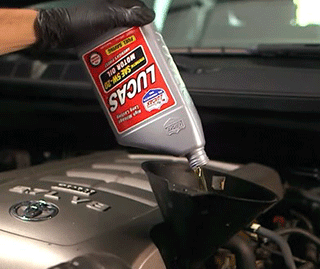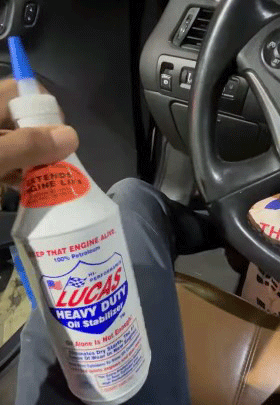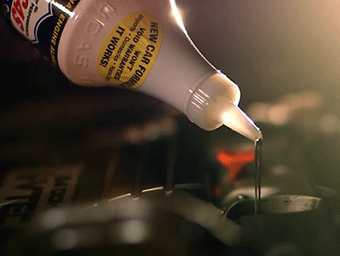If you’re like me and want to keep your engine running smoothly for years to come, you’ve probably heard about Lucas Pure Synthetic Oil Stabilizer. After using it in my vehicles for over a year, I can confidently say it’s a game-changer. Whether you’re dealing with an older engine that needs some TLC or a high-performance machine that demands the best, this stabilizer delivers. In this article, I’ll share my firsthand experience, break down the pros and cons, compare it to other brands, and give you tips on how to get the most out of it. Trust me, if you’re looking to boost your engine’s performance and longevity, this product is worth every penny.
My Experience With Lucas Pure Synthetic Oil Stabilizer
I first tried Lucas Pure Synthetic Oil Stabilizer in my 2010 SUV, which had started to feel a bit sluggish. Here’s what I noticed:

- Improved Mileage: After adding the stabilizer during an oil change, my mileage jumped from 19.5 mpg to 22-23 mpg. It was like giving my engine a second wind.
- Smoother Engine Performance: The engine ran noticeably quieter and smoother, even at higher speeds. It felt like I was driving a newer car.
- Stabilized Oil Pressure: My oil pressure became more consistent, which gave me peace of mind, especially on long trips.
- Reduced Engine Noise: The annoying ticking sound I’d been hearing at idle completely disappeared.
- Easy to Use: Simply pouring it into the oil filler was all it took—no complicated steps or tools required.
- Versatile: I’ve since used it in my other vehicles, including a high-performance sedan and an older truck, with equally impressive results.
- Long-Lasting Effects: Even after 5,000 miles, the benefits were still noticeable, making it a cost-effective addition to my maintenance routine.
Pros Of Lucas Pure Synthetic Oil Stabilizer
Here’s why I think this product is a must-have for any vehicle owner:
- Boosts Fuel Efficiency: As I mentioned, my mileage improved significantly. If you’re looking to save on gas, this is a no-brainer.
- Reduces Engine Noise: The stabilizer quiets down noisy engines, making your ride more comfortable and enjoyable.
- Stabilizes Oil Pressure: It helps maintain consistent oil pressure, which is crucial for engine health and performance.
- Protects Against Wear: The synthetic formula reduces friction and wear, extending the life of your engine.
- Compatible with Synthetic Oil: It works seamlessly with full synthetic oils, enhancing their performance.
- Easy to Use: Just pour it in during an oil change or top-off—no special tools or expertise needed.
- Versatile Application: It’s suitable for both domestic and import engines, as well as transmissions and gearboxes.
- Cost-Effective: A little goes a long way, making it an affordable way to protect your engine.
- Reduces Heat: It helps lower engine temperatures, which is especially beneficial for high-performance or heavy-duty vehicles.
- Improves Overall Performance: From smoother idling to better acceleration, the stabilizer enhances every aspect of engine performance.
Read More: My Thought on Oil Can Henry’s Vs. Jiffy Lube
Cons Of Lucas Pure Synthetic Oil Stabilizer
While I’m a big fan of this product, it’s not without its drawbacks:
- Not a Fix for Major Issues: If your engine has serious problems, this stabilizer won’t magically repair them. It’s a maintenance product, not a cure-all.
- Results May Vary: While I saw significant improvements, your results might differ based on your vehicle’s age, condition, and usage.
- Adds to Oil Change Cost: If you’re on a tight budget, the additional cost might be a concern, though I think it’s worth it.
- Not Suitable for All Engines: While it works with most engines, always check your owner’s manual to ensure compatibility.
- Can Be Overused: Adding too much can thicken the oil, potentially reducing its effectiveness. Stick to the recommended dosage.
- Limited Immediate Impact: While some benefits are noticeable right away, others, like reduced wear, take time to become apparent.
- Availability Issues: Depending on your location, finding this product in stores can sometimes be a challenge.
- Not a Substitute for Regular Maintenance: You still need to follow your vehicle’s maintenance schedule, including regular oil changes.
How To Get The Most Out Of Lucas Pure Synthetic Oil Stabilizer
To maximize the benefits of this stabilizer, here are some tips based on my experience:

- Follow the Instructions: Use the recommended amount for your engine size. Overdoing it can backfire.
- Add During Oil Changes: For the best results, add the stabilizer when you change your oil. This ensures it’s evenly distributed.
- Check Compatibility: Make sure your engine and oil type are compatible with the stabilizer.
- Monitor Performance: Keep an eye on your mileage, engine noise, and overall performance to gauge its effectiveness.
- Use Consistently: For long-term benefits, use the stabilizer regularly, not just as a one-time fix.
- Combine with Quality Oil: Pair it with a high-quality synthetic oil for the best results.
- Store Properly: Keep the bottle in a cool, dry place to maintain its effectiveness.
- Don’t Skip Maintenance: Remember, this is a supplement, not a replacement for regular maintenance.
Lucas Pure Synthetic Oil Stabilizer Vs. Competitors
When it comes to oil stabilizers, there are plenty of options. Here’s how Lucas stacks up against some popular competitors:
Lucas vs. Sea Foam Motor Treatment
- Performance: Lucas focuses on stabilizing oil pressure and reducing wear, while Sea Foam is more about cleaning and conditioning.
- Compatibility: Lucas works better with synthetic oils, whereas Sea Foam is more versatile for different oil types.
- Ease of Use: Both are easy to use, but Lucas is specifically designed for oil stabilization, making it more targeted.
- Price: Lucas is slightly more expensive but offers more specialized benefits.
Lucas vs. Marvel Mystery Oil
- Functionality: Marvel Mystery Oil is more of a multi-purpose product, while Lucas is specifically for oil stabilization.
- Engine Noise: Lucas is better at reducing engine noise and improving smoothness.
- Fuel Efficiency: Lucas has a more noticeable impact on mileage compared to Marvel.
- Durability: Lucas provides longer-lasting protection against wear and tear.
Lucas vs. STP Oil Treatment
- Formula: Lucas uses a pure synthetic formula, while STP is a conventional treatment.
- Performance: Lucas offers better results in terms of oil pressure stabilization and noise reduction.
- Compatibility: STP is more widely compatible with different oil types, but Lucas excels with synthetic oils.
- Price: Lucas is pricier but delivers more specialized benefits.
Maintenance Tips For Using Lucas Pure Synthetic Oil Stabilizer
To get the most out of Lucas Pure Synthetic Oil Stabilizer, follow these maintenance tips:

- Use the Right Amount: Always follow the recommended dosage for your engine size. Overusing it can thicken the oil and reduce its effectiveness.
- Add During Oil Changes: For the best results, add the stabilizer when you change your oil. This ensures it’s evenly distributed throughout the engine.
- Pair with High-Quality Oil: Lucas works best with high-quality synthetic oils. Don’t skimp on the oil itself—this stabilizer is meant to enhance, not replace, good oil.
- Monitor Oil Levels: Keep an eye on your oil levels and top off as needed. The stabilizer doesn’t replace the need for regular oil checks.
- Check for Leaks: If you notice any oil leaks after adding the stabilizer, it might be a sign that your engine has underlying issues that need attention.
- Store Properly: Keep the bottle in a cool, dry place to maintain its effectiveness. Exposure to extreme temperatures can degrade the product.
- Use Consistently: For long-term benefits, use the stabilizer regularly, not just as a one-time fix. It’s designed to protect your engine over time.
- Combine with Regular Maintenance: Don’t skip your vehicle’s regular maintenance schedule. The stabilizer is a supplement, not a replacement for oil changes and other upkeep.
How Lucas Pure Synthetic Oil Stabilizer Compares To Other Brands (Continued)
Let’s continue comparing Lucas to other popular oil stabilizers on the market:
Lucas vs. Royal Purple Max-Clean
- Performance: Lucas focuses on oil stabilization and wear reduction, while Royal Purple is more about cleaning and detoxifying the engine.
- Compatibility: Both work well with synthetic oils, but Lucas is more versatile for different engine types.
- Ease of Use: Lucas is simpler to use, as it’s designed specifically for oil stabilization. Royal Purple requires a bit more attention to dosage and application.
- Price: Lucas is more affordable, making it a better choice for regular use.
Lucas vs. Bardahl No-Smoke
- Functionality: Bardahl is designed to reduce smoke and emissions, while Lucas focuses on stabilizing oil pressure and reducing wear.
- Engine Noise: Lucas is better at quieting noisy engines and improving overall smoothness.
- Fuel Efficiency: Lucas has a more noticeable impact on mileage compared to Bardahl.
- Durability: Lucas provides longer-lasting protection against wear and tear.
Lucas vs. Rislone Engine Treatment
- Formula: Lucas uses a pure synthetic formula, while Rislone is a conventional treatment.
- Performance: Lucas offers better results in terms of oil pressure stabilization and noise reduction.
- Compatibility: Rislone is more widely compatible with different oil types, but Lucas excels with synthetic oils.
- Price: Lucas is pricier but delivers more specialized benefits.
Read More: My Thought on Oil Can Henry’s Vs. Jiffy Lube
Frequently Asked Questions (Faq)
Absolutely! Lucas Pure Synthetic Oil Stabilizer is specifically designed to work with synthetic oils. It enhances their performance by reducing friction, stabilizing oil pressure, and protecting against wear. I’ve used it with full synthetic oil in multiple vehicles, and the results have been fantastic.
Using Lucas stabilizer is incredibly easy. Simply pour the recommended amount into your engine’s oil filler during an oil change or top-off. No special tools or expertise are required. Just make sure to follow the dosage instructions on the bottle for your engine size.
While Lucas stabilizer isn’t primarily a cleaning product, it does help reduce sludge and deposits over time by improving oil flow and reducing friction. For a deeper clean, you might want to pair it with a dedicated engine cleaner like Sea Foam or Royal Purple Max-Clean.
Conclusion
After over a year of using Lucas Pure Synthetic Oil Stabilizer, I can confidently say it’s one of the best investments I’ve made for my vehicles. From improved mileage and smoother engine performance to reduced noise and wear, the benefits are undeniable. While it’s not a miracle cure for serious engine issues, it’s an excellent maintenance product that enhances your engine’s performance and longevity. If you’re looking for an easy, cost-effective way to protect your engine and get more out of every drive, give Lucas a try. Trust me, your engine will thank you.
